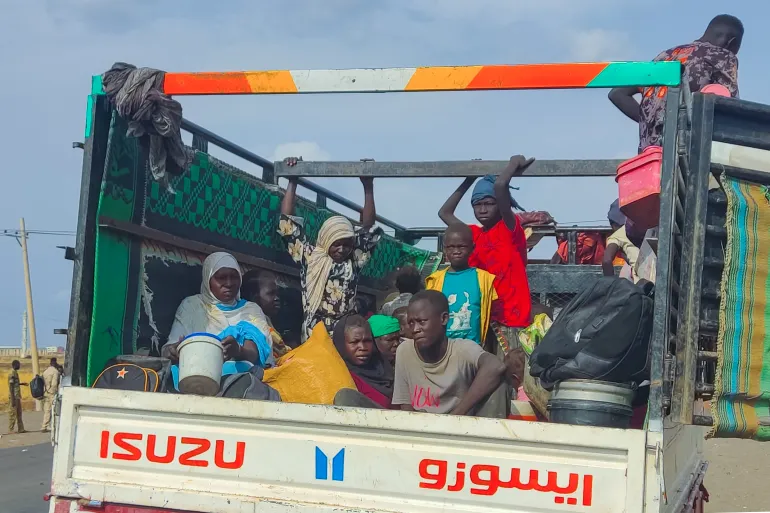Sudan death toll far higher than previously reported – study
4 min read
People displaced from Sudan's Gezira state arrive in packed vehicles to the entrance of the eastern city of Gadarif, June 10 [File: AFP]
A new study has revealed that the death toll from Sudan’s ongoing civil war is significantly higher than previously reported, with over 61,000 people having died in Khartoum state alone. This figure, provided by the Sudan Research Group at the London School of Hygiene and Tropical Medicine, paints a much grimmer picture than the 20,000 confirmed deaths cited by the United Nations and other international organizations.
The majority of these deaths—around 26,000—were directly caused by violence, with the remainder resulting from preventable diseases and starvation. The war, which began in April 2023, has ravaged the country, leaving many areas, particularly in the western region of Darfur, devastated. In addition to the mounting toll from conflict, widespread atrocities and ethnic cleansing have further exacerbated the humanitarian crisis.
According to the Sudan Research Group’s report, the numbers of casualties in other regions of the country, especially Darfur, are believed to be even higher. The ongoing war has created what aid organizations have described as the world’s worst humanitarian crisis, with millions facing displacement and famine. The number of deaths continues to rise, yet with the chaos of the conflict and limited access to affected areas, an accurate count remains elusive.
The UN and international humanitarian agencies had previously relied on a lower death toll of around 20,000 confirmed deaths, but the new study suggests that the situation is far worse. In May, US special envoy for Sudan, Tom Perriello, estimated that up to 150,000 people could have died as a result of the conflict. However, with limited access to data and on-the-ground reports, this number remains speculative.
A War of Atrocities and Displacement
The Sudanese civil war has pitted the Rapid Support Forces (RSF), a paramilitary militia led by Mohamed Hamdan Daglo, against Sudan’s regular army under General Abdel Fattah al-Burhan. The conflict, which began as a power struggle between the two former allies, has led to widespread violence, with both sides accused of committing war crimes. The RSF has been accused of ethnic cleansing in Darfur, where reports of massacres, sexual violence, and forced displacement have surfaced.
Amnesty International recently accused France of violating a UN arms embargo by supplying military technology used by the RSF. According to Amnesty, the RSF has been using French-made defense systems, such as the Galix countermeasure system, which was fitted to vehicles supplied by the UAE. Amnesty called for France and the UAE to halt military transfers to Sudan, citing the risk that such equipment could facilitate further human rights violations in the ongoing conflict.
In response, Amnesty’s Secretary General, Agnès Callamard, demanded that the French government ensure that companies supplying arms to the UAE and other nations maintain stringent export controls to prevent weapons from reaching the RSF and other combatants in Sudan. Despite calls for action, both France and the UAE have yet to comment publicly on the allegations.
Famine and Disease Worsen the Crisis
The toll of the war goes far beyond the death toll, with millions displaced and facing extreme hardship. In addition to violence, Sudan is grappling with widespread hunger and disease. The UN’s World Health Organization (WHO) has confirmed famine conditions in parts of Darfur, while the country’s overall food security situation has worsened. According to the WHO, “starvation is almost everywhere” in Sudan, with the situation growing increasingly dire as the conflict disrupts food production and access to aid.
In August, the UN declared famine conditions in parts of Darfur, with experts warning that starvation was likely to spread across other regions as the war rages on. The international community, however, has been slow to respond, with media coverage overshadowed by other global conflicts, such as the war in Ukraine and tensions in the Middle East.
The UN’s World Health Organization (WHO) director-general, Tedros Adhanom Ghebreyesus, highlighted the severity of the situation during a visit to Sudan, noting that the country is now facing the world’s largest displacement crisis. The scale of the war’s toll on civilians, coupled with the widespread hunger and disease, is being compared to some of the most devastating conflicts of recent years.
A Devastating Humanitarian Crisis
The new report underscores the scale of the devastation caused by the civil war, with 90% of the deaths in Khartoum remaining unrecorded due to the lack of systematic reporting. The study’s lead researcher, Mayson Dahab, noted that there was insufficient data to estimate the overall death toll across Sudan or fully assess the impact of the conflict in other regions.
As the death toll rises and the humanitarian crisis deepens, Sudan’s future remains uncertain. The war has already displaced millions of people, and the country’s fragile infrastructure is struggling to cope with the scale of the crisis. As Sudan faces a prolonged period of instability, the international community faces mounting pressure to address the growing humanitarian disaster and take action to end the violence.
The Sudan Research Group’s findings reflect the grim reality of a country in crisis, with widespread violence, disease, and famine affecting millions. The international community must urgently respond to this growing disaster to prevent further loss of life and provide much-needed humanitarian aid to those in desperate need.







